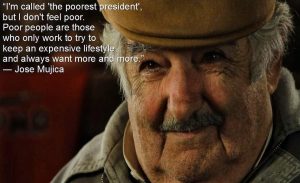At one and the same time we must philosophize, laugh, and manage our household and other business, while never ceasing to proclaim the words of true philosophy. – Vatican Saying 41
According to VS 41, the founders believed that economics is an important component of how Epicureans philosophize. Also, according to Philodemus:
We believe that the tranquil administration of one’s property does not require great subtlety and that wealth is superior to poverty. At the same time we believe that it’s necessary to hand down a tradition of the most general principles and to outline many details in the treatises concerning the care and preservation of possessions.
This means that ancient Epicureans were not only writing down outlines or epitomes of the doctrines on physics and on ethics, but also about economics. When we discuss economics here, we must not assume that the ancient Epicureans referred to what in modern English is referred to as macro-economics (monetary policy, etc.), but micro-economics (household management and business management). Again:
If someone reproaches us because we write about economy, that would be enough for us, together with Epicurus and Metrodorus, who give advice and exhortations on household management in a particularly accurate way, albeit with minimal details. – Philodemus, On Vices and Virtues
This means that these doctrines were handed down by the founders. The word used in these quotes was oikonomias (usually translated as household management). There’s also a Philodeman scroll that bears this name. This is from my commentary on Peri Oikonomias (translated as On the Art of Property Management):
Philodemus makes frequent appeals to the authority of Metrodorus, one of the founders of the School, who promoted the idea that hedonic calculus must be employed in the management of one’s household and economic affairs, making the point time and again that we must run certain risks and go through certain inconveniences in order to avoid greater ruin and gain greater advantages.
He disagreed with the destitute life of the Cynics, and appears to have made this point while arguing against them and in favor of a doctrine of the natural measure of wealth. This corresponds to that which is needed to secure the natural and necessary pleasures, and to have the confident expectation that we will be able to secure them in the future.
While many modern Epicureans are following the founders’ advice to write outlines of the doctrines concerning the physics and ethics, the study of Epicurean economics has been mostly neglected. My attempts to create an outline of the economics when I initially read Peri Oikonomias yielded “Seven Principles of Autarchy” (or, self-sufficiency) at the conclusion of my discussion of the scroll, and last year I dedicated my blog’s content at the evaluation of various aspects of the economics.
One other difficulty with dealing with these doctrines has to do with resistance from Epicureans who are critical of what they see as the so-called “minimalist interpretation”, but who do not seem to be critical of the limitless desires, consumerism, and other problems related to not being able to recognize the upper limit of the natural measure of wealth. This probably has to do with the influence of Ayn Rand and other neoliberal philosophers on many who come to the study of Epicurus, and who attempt to inject Randian conceptions of ambition and greed into Epicureanism–where they clearly do not belong, since Epicurus wanted his followers to have a mind that is content, satisfied, grateful, and capable of understanding how much is enough. For this reason, it is important to clearly understand what the original doctrines on economics were, so as to not be swayed by modern revisionism in either direction (towards extreme greed, or towards extreme minimalism).
Metrodorus Against the Cynics
As we saw above, these doctrines were in part inspired in a rejection of the destitute life of the cynics. We know from Diogenes Laertius’ biography that Epicurus also rejected the Cynic practice of begging daily because this is a wretched way of life and involves much toil and suffering (DL 10.119), and said that the sage would not be a mendicant and would “regard to his property and to his future” (DL 10.8). But Metrodorus may have taken issue with more than the Cynics’ full rejection of wealth. Cynics were known for living like dogs, in utter poverty, sleeping on the streets, not practicing hygiene, and having sex in public. The health and social problems associated with lack of hygiene and a life of squalor raise issues when we carry out hedonic calculus.
Epicurean literary tradition has one scene that shows what the exchanges between the Cynics and the Epicureans may have been like. Chapter Four of A Few Days in Athens depicts a visit made by Gryphus, who is described as a “pale, dirty, hairy cynic” whose tunic was torn, to the Garden.
Gryphus, short, square, and muscular; his tunic of the coarsest and not the cleanest woollen, in some places worn threadbare, and with one open rent of considerable magnitude, that proved the skin to be as well engrained as its covering : his girdle, a rope: his cloak, or rather rag, had the appearance of a sail taken from the wreck of an old trader: his feet bare, and thickly powdered with dust: of his face, little more might be distinguished than the nose; the lower part being obscured by a bushy and wide-spreading beard, and the upper, by a profusion of long, tangled, and grisly hair.
The chapter is meant to have comedic value, but there is of course educational value in it also.
The Natural Measure of Wealth
In arguing against the destitute life of the Cynics, the co-founder of Epicureanism Metrodorus taught the doctrine of the natural measure of wealth. What does this consist of?
The wealth required by nature is limited and is easy to procure; but the wealth required by vain ideals extends to infinity. – Principal Doctrine 15
Poverty, if measured by the natural end, is great wealth; but wealth, if not limited, is great poverty. – Vatican Saying 25
We see here an Epicurean distinction between wealth that is “natural” (physikos) and wealth that is empty (kenos). Seneca attributes these words to Epicurus:
There is also this saying of Epicurus: “If you shape your life according to nature, you will never be poor; if you do so according to opinion, you will never be rich.” For nature’s wants are small; the demands of opinion are boundless.
According to the authors of Philodemus and the New Testament World ,
,
There is for the philosopher a measure of wealth that, following the founders of the school, we have passed down in “On Wealth”, so as to render the account of the art of managing the acquisition of this and the preservation of this. – Column 12 of On the art of property management
Concerning measuring our desires by nature rather than by culture, we must remember this from Letter to Menoeceus:
We must also reflect that of desires some are natural, others are groundless; and that of the natural some are necessary as well as natural, and some natural only. And of the necessary desires some are necessary if we are to be happy, some if the body is to be rid of uneasiness, some if we are even to live. – Epicurus, Letter to Menoeceus
Natural wealth will, therefore, include that wealth by which we procure health (food, water, health care), happiness (friends), and safety (warmth, shelter). But those are just the necessary natural desires. There are additional natural desires which are not necessary, and which merely add variety to our pleasure regimen.
The natural measure of wealth (ploutou metron) is not absolute (it depends on context), but it’s also not arbitrary. Concerning which unnecessary desires may be considered natural, Principal Doctrine 15 teaches that natural wealth is distinguished for being easily acquired (euporistos) while empty wealth is not. Notice that there is no absolute amount of wealth that is assigned to this. The natural measure of wealth will vary according to circumstances.
Philodemus’ On Wealth
There’s one more Philodeman source dealing with wealth. The scroll On Wealth is fragmentary, but mentions that death is nothing to us, probably meaning to explain that wealth will not protect us from death. At a later point in the scroll, Philodemus cites Epicurus offering a point-by-point refutation of Menander’s Georgos (“The Farmer”), a parody of the burdens of poverty. In this parody, the poet personifies Poverty as a hag that would not go away.
The essay On Wealth: New Fragments of Empedocles, Menander, and Epicurus by David Armstrong and Joseph Ponczoch argues that Epicurus defends Poverty in Menander’s Georgos (presumably so long as one is able to procure one’s natural desires, unlike the total destitution of the Cynics), and that
as is apparent from PHerc. 1570 as much as from the texts Balch cites, one can actually distinguish four clear degrees of wealth, with two extremes and two middle terms: immense wealth, (respectable) wealth, (respectable) poverty, and destitution. The notion that a state of poverty can still be respectable is at the heart of the content of pc. 5
Against Extreme Minimalism
In the Letter to Menoeceus, Epicurus described what could be described as a minimalist lifestyle
… we regard. independence of outward things as a great good, not so as in all cases to use little, but so as to be contented with little if we have not much, being honestly persuaded that they have the sweetest enjoyment of luxury who stand least in need of it, and that whatever is natural is easily procured and only the vain and worthless hard to win. Plain fare gives as much pleasure as a costly diet, when one the pain of want has been removed, while bread an water confer the highest possible pleasure when they are brought to hungry lips. To habituate one’s se therefore, to simple and inexpensive diet supplies al that is needful for health, and enables a person to meet the necessary requirements of life without shrinking and it places us in a better condition when we approach at intervals a costly fare and renders us fearless of fortune. – Epicurus, in his Letter to Menoeceus
There seems to be a curriculum of pleasure at play here. We educate ourselves to better enjoy luxurious pleasures if we do not have them frequently. This way, we avoid the hedonic treadmill. We also easily become self-sufficient and confident of our ability to procure our needs by adopting a simple way of living. What we need to keep in mind is:
Frugality too has a limit, and the man who disregards it is like him who errs through excess. – Vatican Saying 63
It’s important to note that the goal of the Epicurean is to live a life filled with all the pleasures that nature makes easily available to us, it’s not to live minimally. As Epicurus says to Menoeceus: it’s “not so as in all cases to use little”. So if the minimalist lifestyle we have chosen generates more disadvantages than advantages, it’s time to reassess the limits of our simple lifestyle. For this reason, Metrodorus said that sometimes we accept many disadvantages for the sake of things without which we would suffer greatly.
Against Extreme Ambition
Concerning the upper limit of the natural measure of wealth, the founders submit the following concerns to our consideration in our choices and avoidances:
The love of money, if unjustly gained, is impious, and, if justly gained, is shameful; for it is unseemly to be parsimonious even with justice on one’s side. – Vatican Saying 43
People generally dislike misers. The word used here, philokrematía (love of money), is also cited by Philodemus in Peri Oikonomias as a vice that we must guard against. It may lead to legal entanglements, reduce the number of our friends, and attract the distrust of friends and business associates. At least one of the Vatican Sayings criticizes how people sometimes sacrifice their freedom for money:
Since the attainment of great wealth can scarcely be accomplished without slavery to crowds or to politicians, a free life cannot obtain much wealth; but such a life already possesses everything in unfailing supply. Should such a life happen to achieve great wealth, this too it can share so as to gain the good will of one’s neighbors. – Vatican Saying 67
Being beholden to crowds or leaders, we may sacrifice our values, or our reputation, or our privacy for money. Some people sacrifice of too much time at work for the sake of money, without the balance of being able to enjoy the fruits of their labor. We call them workaholics. It is difficult to argue that this passes hedonic calculus.
The desire for fame, together with the desire for unlimited amounts of wealth, are both criticized here:
The soul neither rids itself of disturbance nor gains a worthwhile joy through the possession of greatest wealth, nor by the honor and admiration bestowed by the crowd, or through any of the other things sought by unlimited desire. – Vatican Saying 81
We are reminded of the Princeton University study that showed that happiness correlates to wealth with an income of up to $75,000. Beyond that, happiness varies according to other factors, like health, and the amount and quality of friends.
That wealth itself, once acquired, is far from a guarantee of happiness, is attested in the Philodeman scrolls where we see a huge amount of concern with flatterers as a category of false friends. This is probably due to the fact that Philodemus was teaching Epicureanism to wealthy Romans, who attracted many kinds of flatterers, false friends, and people who were seeking their own self-interest by associating with the wealthy. Therefore, even if one is very gifted in interpersonal charm and attracts true friends with ease, it may be difficult for a wealthy person to know with certainty which friends are true ones and which ones are flatterers.
There are other problems tied to not recognizing the upper limit of the natural measure of wealth. Consumerism is tied to anxiety about status, and to false attribution of value to things rather than relations and experiences. Being ostentatious about one’s wealth and suffering from the “keeping up with the Joneses” syndrome may lead to additional problems of debt (which is a form of slavery), and constant craving for more unnecessary things. Once the things we acquire no longer “smell new”, we tire of them and want new toys.
Under what circumstances is ambition advantageous or not, useful or useless?
As we have seen with the “easily acquired” attribution of natural wealth, if the attainment of something comes with little effort and little to no disadvantages, it’s hard to argue against this type of ambition. Particularly, our ambitious efforts lead to wealth that is easily acquired if we employ our aptitude (that which we are good at), and if we enjoy doing what it takes to acquire things. In other words, the greater our aptitude, the less effort we have to put in. If we make great attempts at achieving something that we are not good at, or that we don’t like doing, the effort may not pass hedonic calculus.
Finally, one practical advice given by José Mujica, former president of Uruguay, is that we should measure the true value of things in terms of time instead of money. If we consider how many hours of work it will take to pay for our “new toys”–for instance, a new car–we will be more hesitant to buy frivolous things than if we merely think about the value we get from owning a status symbol. In reality, for as long as we earn an hourly income and have limited amounts of money available (as is the case with almost everyone), it may appear that we are buying things with cash, but we are really buying things with our time and with our lives. If we think about the money that we spend frivolously as the bond of our indentured servitude that it really is, we will become more humane towards ourselves.
Brief Dialogue on Ambition
In order to discern what other Epicureans think about ambition as a virtue or a vice, and about wealth, we had discussions in the Garden of Epicurus Facebook group. Here are a few highlights.
Hiram. What do others think about the ethics of ambition, from an Epicurean perspective? Under which circumstances is ambition advantageous / virtuous and under what conditions is it disadvantageous / a vice?
Ron. Clearly ambition can’t be inherently bad, because Epicurus was very ambitious himself.
Hiram. I don’t think anything is “inherently bad” in Epicurean philosophy, other than pain that doesn’t lead to a greater pleasure.
Doug. If you enjoy doing what you’re doing, it would seem to be fine. If you’re doing it for fame and status, there would be a problem.
Hiram. Is that because fame and status are desires that are impossible to satisfy?
Doug. That would be part of it. In the case of fame and status, there are downsides of these that are commonly not considered until they appear. I’m reminded of what Robert Pirsig did when his book became a best seller and his phone rang off the hook with people asking for interviews. He quit his job, loaded up his RV, and disappeared.
Hiram. Well, then there are people like Whitney Houston and Michael Jackson, who were clearly unhappy and didn’t live lives worth living in spite of their incredible success and fame.
Ron. Not sure about status. Low status can be a source of pain I think. But I would say there is a limit to how much is necessary for a pleasant life, beyond which striving for it is not worth it.
Mike. Let’s be honest. Fame and high status are like a double-edged sword. Yes, there is nothing wrong in desiring and enjoying them. However, that’s not always the case. In many cases, fame and status create much trouble. It is good if they provide peace of mind, bad if they produce anxiety and insecurities. Principal Doctrine 7 is clear on this: “Some people have sought to become famous and renowned, thinking that thus they would make themselves secure against their fellow-humans. If, then, the life of such persons really was secure, they attained natural good; if, however, it was insecure, they have not attained the end which by nature’s own prompting they originally sought.”
Hiram. Famous people frequently lose their privacy. Privacy is an extremely important pleasure that most people take for granted. Consider the British prince and Duchess Megan who recently moved to Canada. Even being royalty can’t make up for the difficulties.
Brief Dialogue on Wealth
Jason. It often results in unnecessary political and/or legal entanglements too. Look at Seneca for an ancient example of wealth not leading to a happy life. I’m sure we can all think of more recent examples too.
Hiram. I have an ambitious acquaintance who is workaholic. She has no children so no reason to work so hard but I have a feeling it keeps her from dealing with “stuff”. Some people avoid having an intellectual or philosophical life in order to avoid existential baggage.
Jason. I know more than one retiree who is “lost” as a result of no longer having to work for a living. I can’t imagine being so bored and incurious that I didn’t know what to do with myself.
Mike. Anxiety is not only a rich man’s disease. It is also a poor man’s problem. There are poor people who are too anxious even about little things. But the fact that Epicurus said that “Wealth, if not limited, is great poverty” implies that infinite desire is vain and therefore produces troubles in the soul such as anxiety, stress, or even paranoia.
An Outline of Oikonomias
I have carried out an investigation of Epicurean economics to the best of my ability, assured by Philodemus that it’s “necessary to hand down a tradition of the most general principles and to outline many details in the treatises concerning the care and preservation of possessions”. As a result of this, below is my outline of the doctrines concerning Epicurean micro-economics. I invite other students to develop their own outlines.
- There is a natural measure of wealth (ploutou metron), and an Epicurean distinction between wealth that is “natural” (physikos) and wealth that is empty (kenos). The wealth required by nature is limited and is easy to procure (euporistos); but the wealth required by vain ideals extends to infinity and is impossible or difficult to procure.
- In economics, as in all else, we must run certain risks and go through certain inconveniences in order to avoid greater ruin and gain greater advantages.
- Since the attainment of great wealth can scarcely be accomplished without slavery, a free life cannot obtain much wealth; but such a life already possesses everything in unfailing supply. Should such a life happen to achieve great wealth, this too it can share so as to gain the good will of one’s neighbors.
- Our ambitious efforts lead to wealth that is easily acquired if we employ our aptitude (that which we are good at), and if we enjoy doing what it takes to acquire things. In other words, the greater our aptitude, the less effort we have to put in. If we make great attempts at achieving something that we are not good at, or that we don’t like doing, the effort may not pass hedonic calculus.
- When we are habituated to simple pleasures, we are in a better position to enjoy luxurious ones.
- Frugality too has a limit, and the man who disregards it is like him who errs through excess.
- There is social wealth in addition to the wealth of things and possessions. Philodemus, in Art of Property Management, compares our investment of time and money and efforts on our friends with “sowing seeds” that will yield fruit in the future. (all the points that follow are from that scroll)
- Association makes labor pleasant. We must choose our company prudently.
- Our revenue must more than meet our immediate needs: it must facilitate a dignified life of leisure.
- It’s prudent to cultivate multiple streams of income, among which deriving fees from the Garden’s teaching mission, rental property income and business ownership, which includes gainful employment of others, have special priority.
- It’s prudent to have fruitful possessions, such as the various forms of ownership of means of production.
Further Reading:
On Philodemus’ Art of Property Management
Philodemus, On Property Management (Writings from the Greco-Roman World)
Horace, Ofellus and Philodemus of Gadara in Sermones 2.2, by Sergio Yona
An Epicurean measure of wealth in Horace
[Philodemus] On Wealth (PHerc. 1570 Cols VI-XX, PCC. 4-6A): New Fragments of Empedocles, Menander, and Epicurus
Philodemus and the New Testament World

with a critical look at Philodemus. He and his teacher Zeno of Sidon, and their group, argued frequently against other schools, and against Epicureans who held different views from their own. There were several Epicurean factions. The sources mention at least two factions: the rhetors (who elaborated on the doctrine, mainly inspired by their discussions with other Schools) and the orthodox (who stuck to memorizing the sources). Philodemus claimed orthodoxy by making frequent appeals to the authority of the four founders, but also engaged in these debates.






